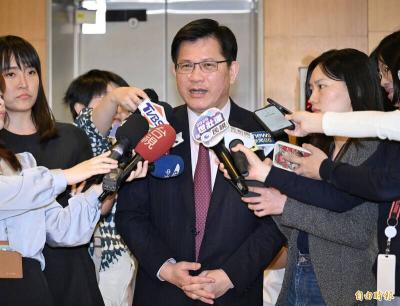The first phase of a referendum on an economic cooperation framework agreement (ECFA) organized by the Taiwan Solidarity Union (TSU) will be completed a month ahead of schedule and with far more than the required number of signatures.
TSU officials told the Taipei Times yesterday they expected to be able to deliver nearly 200,000 signatures to the Executive Yuan’s Referendum Review Committee by the middle of this month, more than double the 86,000 signatures needed to pass the first review.
TSU Associate Director Chou Ni-an (周倪安) said the party’s projections were based on the overwhelming response it had received from non-profit organizations and grassroots movements.
In a show of support, the independence-leaning Neo Formosa Magazine delivered an additional 10,000 signatures to the TSU yesterday afternoon.
Among the signatures was that of former president Chen Shui-bian (陳水扁), who according to his office secretary is a supporter of the referendum drive.
This was the second attempt at a referendum on the controversial trade pact.
A drive initiated by the DPP last year was rebuffed by the Referendum Review Committee despite having an initial review passed by the Central Election Commission.
The committee turned down the petition on the grounds that it was based on a hypothetical situation that did not meet the criteria of the Referendum Act (公投法).
TSU officials said yesterday that in light of government plans to sign the pact in June, these comments would no longer stand.
Chiang said that if the review committee once again rejected the proposal, pro-independence organizations and the TSU would have no choice but to band together and rally in support of the referendum, promising to send up to 1 million protesters onto the streets.
A DPP poll showed that 66.1 percent of the public supports holding a nationwide referendum before government agencies can sign the agreement.
The proposal by the TSU will ask voters to choose whether they agreed or disagree with the government signing any type of economic agreement with China, as exemplified by “President Ma Ying-jeou’s (馬英九) ECFA proposal.”
Meanwhile, President Ma Ying-jeou (馬英九) yesterday said he had asked the Mainland Affairs Council and Ministry of Economic Affairs to provide DPP Chairperson Tsai Ing-wen (蔡英文) with information concerning an ECFA by April 19, one week ahead of their scheduled debate on the topic on April 25.
ADDITIONAL REPORTING BY CNA

Taiwan would welcome the return of Honduras as a diplomatic ally if its next president decides to make such a move, Minister of Foreign Affairs Lin Chia-lung (林佳龍) said yesterday. “Of course, we would welcome Honduras if they want to restore diplomatic ties with Taiwan after their elections,” Lin said at a meeting of the legislature’s Foreign Affairs and National Defense Committee, when asked to comment on statements made by two of the three Honduran presidential candidates during the presidential campaign in the Central American country. Taiwan is paying close attention to the region as a whole in the wake of a

Chinese Nationalist Party (KMT) Chairman Eric Chu (朱立倫), spokeswoman Yang Chih-yu (楊智伃) and Legislator Hsieh Lung-chieh (謝龍介) would be summoned by police for questioning for leading an illegal assembly on Thursday evening last week, Minister of the Interior Liu Shyh-fang (劉世芳) said today. The three KMT officials led an assembly outside the Taipei City Prosecutors’ Office, a restricted area where public assembly is not allowed, protesting the questioning of several KMT staff and searches of KMT headquarters and offices in a recall petition forgery case. Chu, Yang and Hsieh are all suspected of contravening the Assembly and Parade Act (集會遊行法) by holding

President William Lai (賴清德) has appointed former vice president Chen Chien-jen (陳建仁) to attend the late Pope Francis’ funeral at the Vatican City on Saturday on his behalf, the Ministry of Foreign Affairs said today. The Holy See announced Francis’ funeral would take place on Saturday at 10am in St Peter’s Square. The ministry expressed condolences over Francis’ passing and said that Chen would represent Taiwan at the funeral and offer condolences in person. Taiwan and the Vatican have a long-standing and close diplomatic relationship, the ministry said. Both sides agreed to have Chen represent Taiwan at the funeral, given his Catholic identity and

Taiwan would welcome the return of Honduras as a diplomatic ally if the next president of that country decides to make such a move, Minister of Foreign Affairs Lin Chia-lung (林佳龍) said today. “We would welcome Honduras if they want to restore diplomatic ties with Taiwan after their elections,” Lin said during a legislative hearing. At the same time, Taiwan is paying close attention to the Central American region as a whole, in the wake of a visit there earlier this year by US Secretary of State Marco Rubio, Lin said. Rubio visited Panama, El Salvador, Costa Rica and Guatemala, during which he